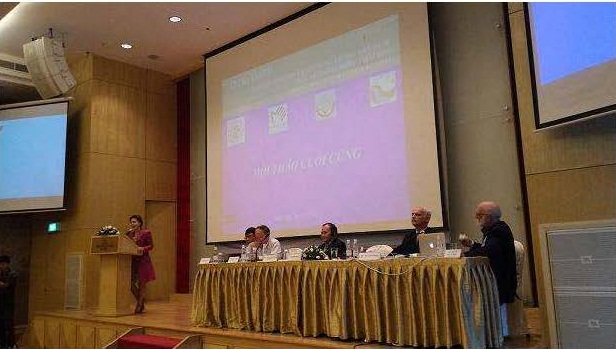Final workshop of the project “Integrated and Sustainable Management of Red – Thai Binh River System in a Changing Climate (IMRR)”
On November 19, 2015, together with Politecnico di Milano (POLIMI), the Institute of Water Resources Planning held a final project workshop disseminating the results of the project: “Integrated and sustainable water management of Red –Thai Binh River System in a changing climate” (IMRR). The workshop was chaired by Mr. Hoang Van Thang – Vice Minister, Ministry of Agriculture and Rural Development, Ms. Cecilia Piccioni – Ambassador of Italian Embassy in Vietnam, Mr. Riccardo Mattei – Director of Italian Development Cooperation Office in Vietnam, Assoc.Prof. Dr. Bui Nam Sach, Director General of the Institute of Water Resources Planning (IWRP) and Prof. Rodolfo Soncini Sessa from POLIMI. The participants to the workshop were representatives and technical staff from Ministry of Agricultural and Rural Development; Ministry of Natural Resources and Environment, the provinces and cities of Bac Giang, Yen Bai, Tuyen Quang, Thai Binh, Hanoi and Hoa Binh, Electricity of Vietnam and several professional associations: Vietnam Water Resources Association , Viet Nam Commission on Irrigation and Drainage (VNCID) etc.
The IMRR project aims at developing and promoting strategies for the sustainable management of the Red-Thai Binh Rivers System in Vietnam through coordinated decision-making and negotiation, supported by modelling and optimization tools and through capacity building of local authorities in the water sector. The Project is funded by the Italian Ministry of Foreign Affair as part of its development cooperation program.
The Red-Thai Binh Rivers basin is the second largest of Viet Nam. Despite the construction of several large-scale reservoirs (Hoa Binh, Thac Ba, Tuyen Quang and Son La), lack of coordination and inefficient operation of the reservoirs have resulted in frequent water shortages causing loss of agricultural production, interruptions to navigation, increased pollution and environmental degradation. Conflicts among water uses in the basin, including hydropower production, flood control and water supply, and negative impacts on long-term sustainability (e.g. hydrological alteration, river aggradation and salt intrusion) are expected to increase under the combined pressure of increasing water and energy demand, and climate change.
The goal of the IMRR project is to improve water management practice in the Red-Thai Binh Rivers system with the purpose of meeting Vietnamese society's long-term needs for water resources while maintaining essential ecological services and improving the economic benefits from hydropower production and agriculture.

Specifically, the project objectives are:
- to improve the efficiency, effectiveness and environmental sustainability of water management in the basin through advanced modelling tools and supporting stakeholders dialogue, coordination and negotiations;
- to capacity-building in water governance by favouring experience-sharing and transfer of expertise, methodology and tools to Viet Nam.
The main project result is Red-TwoLe, a sophisticated computer system integrating a variety of models to support the real-time operations of the four strategic reservoirs in the Red-Thai Binh Rivers system. Red-Twole has been installed and configured on IWRP’s server. During the Final Basin Meeting, a copy of Red-TwoLe will be also delivered as ready-to-run virtual machines to the Ministry of Agriculture and Rural Development and the Ministry of Natural Resources and Environment.
Project results show that there is room for improving the existing system regulation with respect to 2010 conditions, potentially attaining a reduction of 10-33% in energy deficit, 70% in flood damages, and 93% in water supply deficit. In addition, IMRR solutions ensure no overcoming of the 13.4 m dykes protecting Ha Noi downtown in case of extreme floods (i.e. 500 years return period), while also attaining better performance in water supply under extreme droughts. These solutions seem also to outperform the existing flood management guidelines under such extreme conditions.
Further information related to the IMRR project and workshop was also made available on the project website at http://www.imrr.info and through the public media (Quoc Hoi TV, VTV14, Vietnam News, TTXVN).
- Proposing solutions for water diversion and water connection in the North Central Region in order to optimize the capacity of water storing, regulating and distributing to meet the requirements of socio-economic development
- New approach to online hydrodynamic modeling in flood and inundation forecasting at the Institute of Water Resources Planning
- Grassroots-level acceptance of the State-level scientific research project: "Proposing solutions to prevent flooding and inundation for Bui river basin and surrounding areas" coded DTDL.CN-16/20.
- Training on Real Water Savings in Agricultural Systems (REWAS)
- JST is to fund six research projects for the e-ASIA Joint Research Program in the fields of “Advanced Interdisciplinary Research towards Innovation (Water Resource Management)” and “Environment (Climate Change Impact on Natural and Human Systems)”
- Technological capacities
- Training series on Remote sensing for Land and Water management
- Seminar “Integrated water management in the Red River: remote sensing and modeling for optimal reservoir management” at the IWRP
- Mini-seminar between Institute of Water Resources Planning and Collecte Localisation Satellites Group (CLS), France.
- Water Accounting for Vietnam Project Workshop at ADB Office in Hanoi
- Seminar on Cooperative training program "Application of remote sensing in water resources management"
- A two-day online training on Remote Sensing of Drought
- Mekong River Commission trains facilitators on use of hydropower sustainability assessment tool
- Science PhD thesis: Quantifying the distribution of alluvial Mekong Delta: Present and Future.
- Scientific and technology studies





















